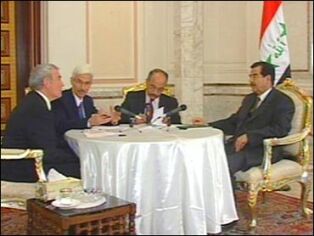The Scandal Lobby
From The New CriterionIs it, or ought it to be, a legitimate plea in defense of rude or boorish or insulting behavior that it is what the rude or boorish or insulting person “really thinks”? Not many years since, I fancy, no one would seriously have maintained that it was. Even today, we are if anything overly sensitive about giving offense to the amour propre of people who are fat or unattractive or stupid or lacking in good taste or good manners. Yet somehow manners themselves have learned to look with indulgence upon the most appalling imputations, so long as they are or can claim to be sincerely believed, against the character, honor or veracity of people who were once thought to be owed a certain degree of respect and even deference. Say, the president of the United States.
True, there were some protests when Congressmen David Bonior and Jim McDermott, speaking from Baghdad, said on “This Week” with George Stephanopoulos that assurances of the good intentions of Saddam Hussein and the Iraqi leadership had to be taken “at their face value” while President Bush could only be expected to “mislead the American people” in order to start a war. Michael Kelly called it “obscene” of them. George Will, on the spot, said that it was “the most disgraceful performance by an American official abroad in my lifetime.” But Kelly and Will are both supporters of the president’s policy on Iraq. Where were the denunciations from his opponents, from principled Democrats and anti-warriors allied with Bonior and McDermott who were prepared to say that the congressmen had put themselves beyond the pale of civilized discourse?
Well, The New Republic complained, but rather on tactical than principled grounds: “At a time when Democrats are trying to raise questions about a war with Iraq without appearing unpatriotic or pacifistic,” wrote Michael Crowley, “ABC’s ‘This Week’ featured an interview with two liberal congressmen who probably convinced plenty of viewers they are both.” Questioned by Tim Russert on “Meet the Press,” the Senate Majority Leader, Tom Daschle, said that he wouldn’t have said what Bonior and McDermott had said, and that the remarks were “awfully close” to going over the line, but he was only outraged on his own behalf. The President, he thought, had been guilty of at least as grave an insult to him and the Democratic leadership in Congress by saying that they were “not interested in national security.”
He had a point. There was a mixup about the occasion and context of the president’s remark, Daschle appearing to suppose that it had been said of those, mainly Democrats, who opposed his Iraq policy when in fact it had been said of those, also mainly Democrats, who were holding out against the Bush proposals for a Department of Homeland Security by insisting that the employees of any such department should have the full collective bargaining rights enjoyed at present by those at present deemed not to be engaged with national security. But the principle to which Daschle held tight appeared to be that, whatever the context, it was illegitimate and, as the British would say, “unparliamentary” to cast aspersions on one’s opponent’s patriotism or concern for national security.
Yet only a few days earlier his party’s elder statesman and ex-president, Bill Clinton, was broadly hinting to the Labour Party conference in Blackpool, England, that his successor was a dangerous character, foolishly inclined to “go it alone” in foreign policy, who had to be restrained by his friend, Tony Blair. Under the circumstances, it was hardly likely that the Republicans would agree to a rhetorical armistice. The extreme position in each side’s characterization of the other — the Republican contention that the Democrats are unpatriotic and irresponsible and the Democratic contention that the Republicans are trigger-happy and uncaring — appears to have become the default setting for every argument in what is still but increasingly absurdly called the public debate.
It’s not that politics have not often, possibly always, been full of venomous hatreds and graceless, baseless insult. Probably politics always will be. But just now things are particularly bad. Robert Novak writes of the “poisonous state of the U.S. Senate” at the moment, to the point that it is “virtually non-functioning” and “like nothing I have seen in 45 years of covering Washington.” He attributes the loss of the Senate’s “traditional collegiality” to the hatreds aroused over the Bork confirmation hearings of fifteen years ago, or even the treatment of Abe Fortas twenty years before that. Perhaps so. But bitter struggles like these would not produce such lasting effects if there were still a vocal constituency for rhetorical decency and restraint and responsibility. Yet there is none, or none audible at the moment. And the media, which piques itself on its “objectivity” and so might be expected to comprise such a constituency, is behaving rather like spectators at a street fight, holding the politicians’ coats and screaming at them to hit harder, to draw more blood.
Look at Michael Crowley again, writing in the New Republic. Gleefully he quotes a joke made by Jim Jordan, executive director of the Democratic Senatorial Campaign Committee about “General Rove” when he “calls in the air strikes in October.” But though Jordan immediately pulled back from such a scandalous allegation — saying, “Certainly none of us want to think that the administration, for domestic political reasons, would use the war. I think the temptation will be strong” — Crowley reads this as meaning that Jordan “took the notion seriously, if not quite literally.” And he goes on to quote “a senior aide to one Democratic senator” as saying that the party leaders are “largely united” in the opinion that the administration “has manufactured an urgent debate over Iraq in order to win seats in Congress this fall.”
He treats the anonymity of this source, as so many journalists do these days, as something rather to recommend it than to be apologized for. The leprous distillment being poured in his ears is the more likely to be the real goods, he thinks, if the poisoner wishes to remain concealed. And he goes on to deconstruct the public pronouncements of named Democrats to show that they must share the view of the anonymous “staffer.” When he quotes Tom Daschle as saying that the “politicization” of the war is something to be worried about, but that he, Daschle, is not himself “one who shares the view that it is being politicized,” Crowley scoffs at a gentlemanly qualification so “implausibly” made.
Or look at the piece the ABC News political director, Mark Halperin, wrote for the New York Times called “Reporters Try the Silent Treatment.” At first you might think here, at last, is the voice of decorum and good manners reasserting itself, since Halperin begins by praising the “restraint” of the White House press corps. Unfortunately, what he means is that for once the reporters didn’t shout their questions out of turn, so permitting Ari Fleischer, the White House press secretary, to escape from a grilling designed to force him either to affirm that the president really had questioned Democrats’ patriotism or to climb down in the matter of those allegedly “not interested in the security of the American people.” Oh no, Ari, Mr Halperin says, we’re not going to allow any fudged diplomatic solution. We want the red meat of a blood insult, or else a humiliating retraction.
Well, you can see how it might sell more papers, or cause more viewers to tune in to the evening news, but no one can suppose it to be in the interest of the country. Politics depends on the fudged diplomatic solution and the press, in its own interests, is increasingly not allowing it. Their rhetoric is not only more strident and uncompromising in itself, but is designed to force politicians to come along down the same road. Of course one sympathizes with the righteous indignation of the conservative columnist, Cal Thomas, in calling McDermott and Bonior “the Bozos of Baghdad.” Their giving the lie to their president on foreign soil, he says, “comes from representatives of a party that defended through impeachment the biggest liar in presidential history.” But what does such an insult accomplish?
Say that Mr Clinton deserves that title — even though “the biggest liar in presidential history” is one for which there is some competition. What Thomas doesn’t see is that such a characterization, whether true or false, is precisely why McDermott and Bonior said what they said, not because of any particular instance of mendacity on the president’s part. You call our guy a liar, we call your guy a liar. Was Clinton corrupt? Then, just as the night follows the day, Bush also will be found to be corrupt. That is just the way the political competition works in the absence of any agreed-upon rhetorical boundaries.
But what if the president really is a liar and corrupt? Surely, the fact should not be allowed to pass unnoticed? Would it not be morally and politically irresponsible for the Democrats to fail to call attention to the fact that all the horrors of war were about to be unleashed, that American soldiers were about to be put into harm’s way, on the basis of someone’s falsehood and disregard of the truth? Would it not be criminally negligent for Republicans to fail to point out that national security was being put at risk solely in order to pay off someone else’s political debt to the AFL-CIO? If they truly believe these things, haven’t they the duty to speak up and warn the American people of the nefarious business afoot?
Well, no. For the poisoning of the wells of public discourse that results from attributing to one’s opponent base and corrupt motives may actually be a worse thing than the evils it seeks to forestall. Just as we recognize that some kinds of security are not worth having at the expense of certain fundamental liberties, so we ought to recognize that political decision-making of a kind that all true patriots and honorable men would advocate becomes impossible when the patriotism and honor of the decision-makers is allowed to be called into question. Maybe even war is better — better for us, if not for the Iraqis — than allowing ourselves to think that our fellow-countrymen make war wantonly and irresponsibly.
“Allowing ourselves to think” — ah, there’s the problem. That’s why we have no notion (or only the most rudimentary notion) of what it means to be unparliamentary, or to speak, however sincerely, illegitimately and impoliticly. For surely there should be no restraint upon thought? Nor yet upon the freedom to speak the thought? The worship of “free speech” in combination with the American belief in personal authenticity is lethal in this respect. It means that many people, perhaps most people in our country today, would consider anyone who felt constrained by parliamentary or honorable considerations not to say what he thought to be guilty of “hypocrisy.”
True, we do have some idea of rhetorical excess. Kathleen Kennedy Townsend, running for governor of Maryland this autumn, fired a campaign aide who compared her opponent to Hitler. So in the German election campaign did Gerhard Schröder fire his justice minister, Herta Daubler-Gmelin, for comparing President Bush to the late German chancellor. Of course the Germans have good reason to be sensitive about the H-word, but in America even so much restraint as this is not to be relied upon. Back in 1972, George McGovern compared Richard Nixon to Hitler, and he has never felt any need to apologize. In 1964, a great many Democrats compared Barry Goldwater to Hitler and now have forgotten all about it, as I found out when I casually alluded to the matter recently in the pages of the Times Literary Supplement. In any case we ought to have some sense of a limit short of the Hitler analogy — say at the point where we call into question an opponent’s good faith.
Thus Terry Moran of ABC to Ari Fleischer: “Can you assure the American people that this elevated threat alert is not part of the administration’s effort to convince people that the danger is such that military action against Iraq is necessary?” What could be the point of such a question? It depends on the questioner’s assurance that his target cannot so assure the American people, since any such assurance must be subject to the same doubt. “I ne’er heard yet,” says the insanely suspicious Leontes to his innocent wife Hermione when she denies his charge of adultery in the Winter’s Tale, “That any of these bolder vices wanted/Less impudence to gainsay what they did/Than to perform it first.” It is an example of a truth that is nevertheless unreasonable in its context and only serves to remind the audience of the self-reinforcing character of mistrust. Us it reminds of the infinite regress of suspicion and bad feeling that has come to characterize American politics in the post-Watergate era.
But Moran, like McDermott and Bonior, was simply playing the game the way we are used to seeing it played, which is a reminder that the rhetorical weapons of mass destruction that are now so regularly employed in public life sometimes — perhaps often — do not arise out of a sincere conviction of the other side’s perfidy. If Democrats really thought that the president was an incorrigible liar or Republicans really thought that Democrats put self-interest above the national interest they could hardly continue to co-operate as much as they do in getting the nation’s business done. Among the politicians, such hyperbole is just what each side thinks it has to do to obtain an advantage over the other in the eyes of voters whom everyone supposes to be too stupid to understand any matter of political debate not painted in the crudest of black-and-white contrasts.
Among journalists, who might be thought to have less at stake in the argument, the blackguarding of opponents is as I have suggested much more enthusiastic. This is especially true where, as on the New York Times’s editorial pages, the writers and pundits appear to exist in a world so self-contained and self-satisfied about its own moral and political righteousness that they could go for years without ever having to meet anyone from the other side, let alone seriously to consider their views. Yet the Times is still enough of a journalistic entity to play the scandal game simply for its own sake, and without regard to the political color of its victims.
Does anyone really suppose, for example, that the newspaper of record’s playing up of a Republican report last month that the $1 million in gifts unreported by the Clintons because they were donated to the Bill Clinton Presidential Library was a public-spirited exposure of corruption in high places? Perhaps the Republican congressman, Mr Doug Ose of California, who was the inspiration behind the investigation and who wants tougher rules on presidential gift-giving thinks so. At least he says he does. According to the Times, he “suggested that the people who gave these gifts to the Clintons could have been trying to gain access to the White House and influence the administration’s policy decisions.”
Mind you, he is talking here not about satchels full of cash but Navajo blankets and paintings and teapots and various sorts of tchotchkes that world leaders and important people regularly present to each other as confirmations of their importance. Rep Ose has in his sights a sculpture of a goddess, with wooden pedestal, worth $2,100 given by James Riady, the Indonesian banker who has paid millions in fines for his illegal donations to the 1992 Clinton campaign. After those huge illegal campaign contributions, what additional advantage could Riady have hoped for from such a gewgaw? Ose is just playing the political game — any stick with which to beat the other side — which the “scandal”-loving press happily plays along with. Even the massively pro-Clinton New York Times.
The same day that the story of Clinton’s sculpted goddess broke, fearless and crusading Dana Milbank of the Washington Post reported, on the basis of other reports in the Wall Street Journal and the Boston Globe, that “when President Bush served as a director of an energy company 12 years ago, he approved the creation of an off-balance-sheet partnership that reduced the company’s debts and improved earnings in a transaction similar to those that led to the collapse of Enron Corp.” Similar, eh? That’s good enough for this journalistic Savonarola, even though he acknowledges that “unlike Enron, which used partnerships to conceal debts and loss- making operations, Harken’s partnership followed accounting rules and was disclosed to investors and regulators.” Also that “Bush did not profit personally from the transaction.”
What then was the point of reporting it at length a dozen years later in the Washington Post? Well, if you look real close you could see “an unwelcome link between Bush and the accounting scandals that have spooked investor confidence this year.” That word “link” is obviously a very useful one, since it can cover anything from an accessory before the fact to, well, “similar.” That’s the point. If our public discourse demands scandal, scandal must and will be found to meet the demand. The point isn’t that Bush’s behavior was above reproach, any more than Clinton’s was in the Whitewater affair. The point is that looking for, and finding, things to reproach him with has become so largely what politics consists of in the media’s view.
If we seek for corruption, therefore, do we not find it here? Ought not the media, who see their very existence as depending on their adversarial — that is mistrustful — position in relation to established power, to be required to identify themselves, jointly and severally, as a lobby? For that is what they are. They are the scandal lobby — the well-funded purveyors of a product potentially much more dangerous than tobacco whose interaction with our elected officials is almost entirely taken up either with the harvest of more scandal or with making sure that the legal obstacles to their processing and marketing of scandal are kept to a minimum. Moreover, their stubborn and insistent refusal to acknowledge their private and pecuniary interest in the scandal they report suggests that they do not themselves deserve the presumption of good faith that they so regularly deny to others. Their frankly unbelievable claim that they have no interests — that they are purely objective and bias free — and so they can never have a conflict of interest and can never be questioned and suspected themselves as they claim to be entitled by their unique (and impossible) position to question and suspect others should be exposed as the fraud it is.
Discover more from James Bowman
Subscribe to get the latest posts to your email.







